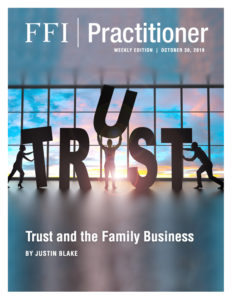
View this edition in our enhanced digital edition format with supporting visual insight and information.
How have shifts in employee expectations and other pronounced societal changes impacted employee trust within family businesses? This week, Justin Blake, of Edelman, shares the results from the 2019 Edelman Trust Barometer and presents the implications of the survey results on family enterprises.
Family businesses are highly trusted – in fact, they are the most trusted form of business globally.
That may seem a surprising fact considering that only 56 percent of the general population trust business overall, according to the 2019 Edelman Trust Barometer, a survey of 33,000 people across 27 markets.
We have been studying trust in family businesses since 2013, and this relatively strong trust has remained constant since then. The 2019 study showed that family business is trusted by 69 percent of the general population, a 13-point advantage over trust in business in general.
But this significant trust advantage is now at risk, as family businesses are susceptible to pronounced societal changes, especially shifts in the expectations that employees now bring to the workplace. Understanding how trust works at work can help family businesses to better navigate these new expectations.
The Employee Factor
The 2019 Edelman Trust Barometer shows a significant change in trust in the past year—people have shifted their trust to the relationships within their control, most notably their employers. This relationship is viewed as being close, local, and personal. Globally, 75 percent of employees trust their employer to do what is right, significantly more than NGOs (57 percent), business (56 percent), and media (47 percent).
Employees are ready and willing to trust their employers, but the trust must be earned through more than “business as usual.” Employees’ expectation that prospective employers will join them in taking action on societal issues (67 percent) is nearly as high as their expectations of personal empowerment (74 percent) and job opportunity (80 percent). In addition, 71 percent of employees believe it’s critically important for “my CEO” to respond to challenging times.
Employees of large family businesses also hold these expectations, but they perceive their employers to be more values-driven and more trustworthy sources of information about social issues, and they find their CEOs more credible than their non-family business counterparts:
- 64 percent of large family business employees agree that the organization they work for acts on its values, versus 54 percent of large non-family business employees who say the same. Large family businesses also enjoy a 10-point advantage on their employees agreeing that the organization acts on its values, an eight-point advantage on their CEOs speaking up on issues, and a five-point advantage on their CEOs embodying the organizations’ values.
Why this matters: Employees want to work for a company that has strong values, and they want to see those values appreciated and acted upon by the company’s leaders.
- 68 percent of large family business employees look to their employer to be a trustworthy source of information about social issues and other important issues, versus 62 percent of non-family business employees who say the same.
Why this matters: Employees feel invested in their employer relationship because it is tangible, passed on through personal interactions with colleagues and management on a day-to-day basis in an environment they understand. Moreover, the relationship with their employer comes with a sense of control; they can choose to change jobs and have some leverage over the relationship.
- 52 percent of large family business employees are more likely to believe what the CEO says about the company they work for, compared to only 41 percent of large non-family business employees who say the same. In addition, CEOs of large family businesses are more trusted regarding company news than independent news sources are. Employees of large non-family businesses trust independent news sources more than they trust their CEOs.
Why this matters: Communication and transparency with employees and key stakeholders pays off, especially in building trust. Being the first to share company news gives employees significant reassurance in leadership and in the company.
Where Family Business Falls Short on Trust—and How to Build It
While the Edelman Trust Barometer illustrates the relatively positive views that employees hold of family businesses, there are several key areas where family business employers fall short on expectations, especially for employees.
Family business employers fall short on expectations including regular communications (15-point performance gap), training programs (11-point performance gap), and employees having a voice (10-point performance gap). In order to improve in these areas, building trust with employees is Job Number 1.
Paramount in building trust with employees are taking the lead on change, responding to issues that matter, and helping employees get to know and relate to the CEO.
- 79 percent of large family business employees say that the CEO should take the lead on change rather than waiting for the government to impose it.
While people are looking for reliable information, they are also looking for leadership. As people’s trust in government lags behind their trust in business, CEOs of family businesses must speak up on issues such as equal pay, discrimination, sustainability, and job training.
- 73 percent of large family business employees agree that it is critically important for their CEO to respond to challenging times.
People want to hear not just from CEOs in general, but from their CEO. Most large family business employees say that it is critically important for their employer to respond to and to talk about challenging times and sensitive subjects. This includes not just industry-related issues, but also political events, national crises, and issues of concern to employees. Employees want to work for a company that offers leadership, one that stands up for them and their shared values.
- 80 percent of large family business employees say knowing the CEO’s personal values is important to building trust.
Employees want to know their CEO on a personal level. Sharing the CEO’s personal success story, the obstacles overcome over the course of her career, and her personal philanthropic activities are important to building trust.
- 54 percent of large family business employees want their business leaders to speak like regular people.
Employees also want a leader they can relate to. Speaking like a “regular person” is more valued than speaking like a highly educated person. Communicating personal values and stories, cutting out corporate jargon, and focusing on relatable language are key steps to a more trusting employee-employer relationship.
Leveraging the Family Trust Advantage
Family businesses that want to continue to enjoy their trust advantage over non-family businesses should consider these three communications strategies:
- Empower employees: Give employees a voice. Maximize the highly valued and trusted employer-employee relationship by sharing information with employees and encouraging them to do the same.
- Tell your story: Communication is key. Employers need to communicate their personal, family, and business values internally and externally, and share their family story and heritage with key stakeholders, including perspective employees.
- Take the lead: Show a personal commitment to issues that matter inside and outside the organization. They should take the lead on change by improving societal conditions in the local communities in which they operate.
Family businesses would be wise to pursue a strong bottom line of employee trust. The more employees trust, the more satisfied and productive they will be, and the more a family business can contribute to a better society for all.
About the Contributor
 Justin Blake leads Edelman’s Global Family Business and Foundations Executive Positioning offerings. Through the Family Business and Foundations offer, Justin works with some of the world’s leading family companies to build and protect their reputations and maintain trust to advance business objectives. He can be reached at justin.blake@edelman.com.
Justin Blake leads Edelman’s Global Family Business and Foundations Executive Positioning offerings. Through the Family Business and Foundations offer, Justin works with some of the world’s leading family companies to build and protect their reputations and maintain trust to advance business objectives. He can be reached at justin.blake@edelman.com.
About Edelman
Edelman is a global communications firm that partners with businesses and organizations to evolve, promote and protect their brands and reputations. Grounded by core values and strengthened by its independence, the firm helps clients communicate, engage, and build relationships with their stakeholders.

View this edition in our enhanced digital edition format with supporting visual insight and information.





